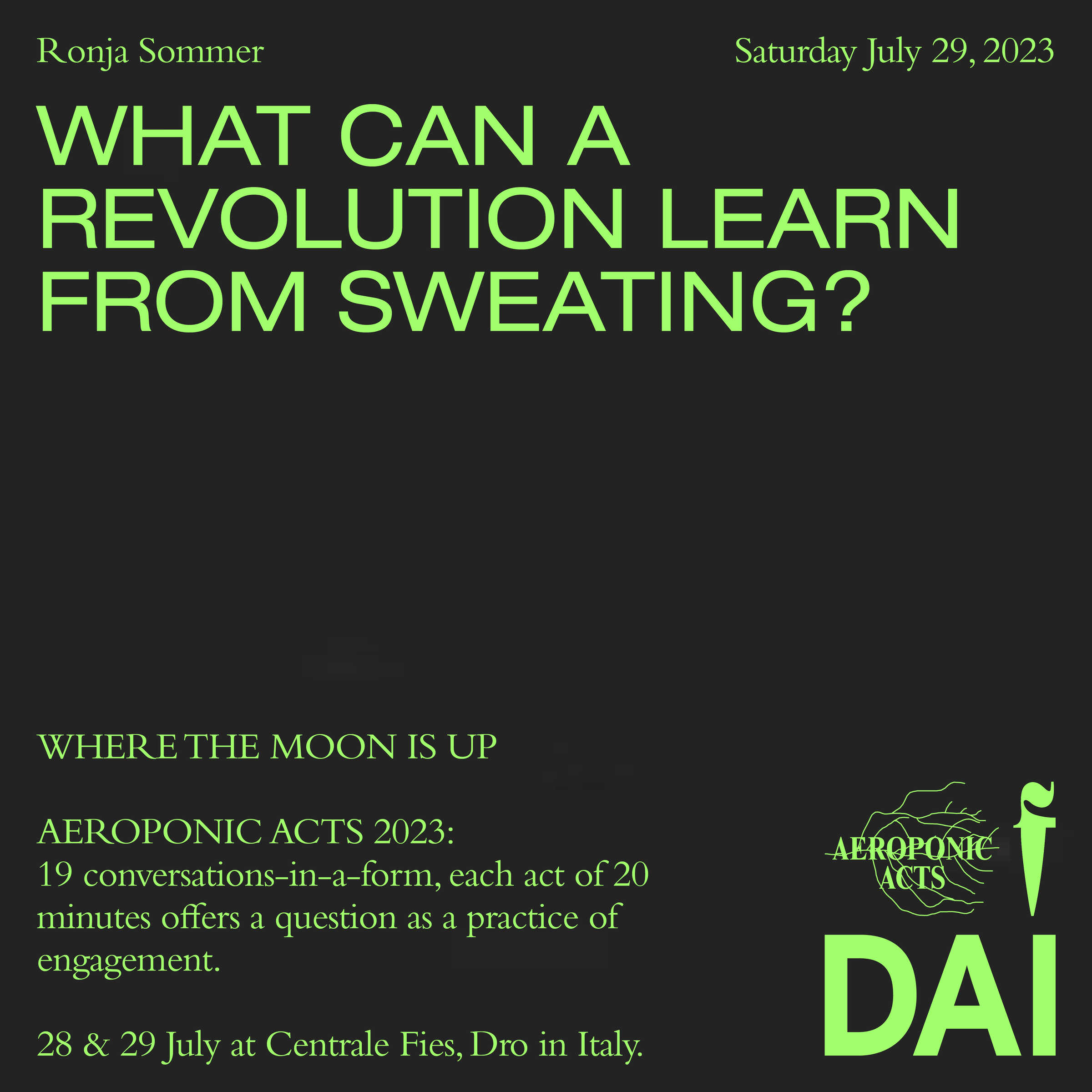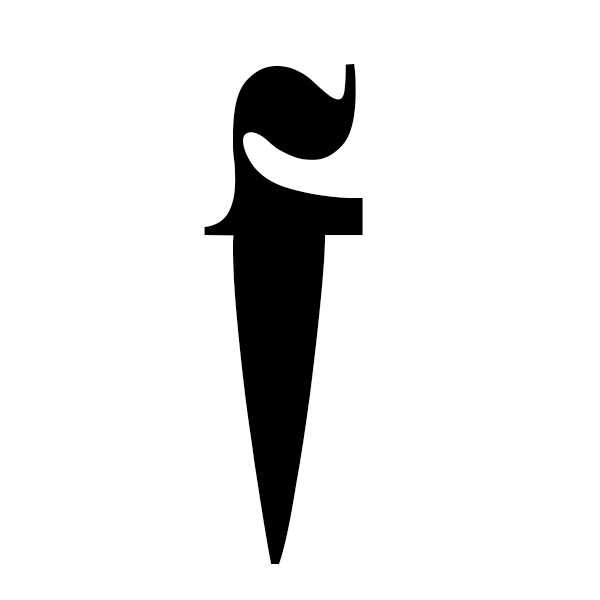Ronja Sommer ~ such a smart body
Ronja Sommer's "such a smart body" was presented before live audience at Centrale Fies, Dro, Italy on July 29th, 2023 as one of 19 AEROPONIC ACTS of WHERE THE MOON IS UP curated by Elisa Giuliani.
Here you will find the documentation of Ronja Sommer's presentation as filmed by Baha Görkem Yalım. The written report is by Giulia Crispiani and it includes a summary of the comments by esteemed guest respondents.
such a smart body
Ronja Sommer's question: What can a revolution learn from sweating?
Ronja's introduction: „Keep sweating, floss on my enemies. With the tongue, come energy, baby“ Alewya.
The shape of human movements is indeterminate, in the sense that it reacts to encounters. Transformation happens in the now, through touch. Illness, love and labour leaves traces. Residues of the past forming the present and potential futures. How to come to states of openness or restriction? Sweat is an indicator of changing tension to materiality within the body. An index that reaches from labour to somatic residues. Can thinking of the porousness of the skin, help navigate a world with violently borders?
Sweat is ephemeral... does a rhythm... regulation... healing... releasing... leaking. Sweating creates shame... is beyond normal... is not the answer, but the question... can be a communal act.
I invite you to move, go higher, go deeper, go internal. To become softer, and by this stronger. Re-move a layer. Trust in the uncontrolled. Learn from the smartest teacher. Let's keep sweating on our enemies!
Giulia's report: “Keep sweating”—says the performer dressed in white in the middle of the space, all lights on—“sweat is an index that reaches from labour to somatic residue. Let’s keep sweating on our enemies.” More performers dressed in white come in and offer water and invite everyone to move—if you want to step out you’re invited to sit and smell what is happening. Everyone goes outside, the performers invite everyone to run back and forth on the bridge in front of the Centrale, then bring everyone back in and ask them to take their shoes off and join on stage and do some stretching and guided somatic session. Then the audience is asked to pair with somebody of a similar body type, then instructed to perform some exercises. After a while the room starts to smell like bodies. When everybody is laying on the floor—some on top of each other, some touching—a huge projection is turned on (some abstract water reflection?) and we hear a voice off stage moaning vowels. The voice turns into a body walking forward on stage and singing, moving around the stage singing followed by spotlight—“viscosity, porosity, touching something such as smart body.” Everyone is still laying down for the whole song. Everybody is sweating.
Phanuel Antwi The relationship between sweat and breath—we can think of in terms of creation and labour. I was seeing the traces of sweat on someone’s shirt. Sweat is the memory of others we come in contact with. I feel the history of my partner, there were paddles of sweat, and we’re witnessing each other’s history. Sweat is erotics, sensuality, the entanglement of our life is captured by sweat—you got us to experience this.
Ayesha Hameed The revolution starts with touch, in this moment of tenderness when we’re lying together, in the intimacy of touching a sweating body. You brought us into this high school mood of following orders, it didn’t feel revolutionary. Then this labour of not understanding why we’re doing what we’re doing, and we get to understand we’re building trust. Maybe it’s sweaty tenderness, I was open to being touched by the music and your singing. I felt I kind of proximity with everyone laying down, their touching and tenderness.
Francesco Urbano Ragazzi This is a structural piece, you’re using the basic element of the mise en scene and you’re enlarging it to make much more out of it. You also manage time very well technically and your way to lead the group was rhythmically well intended. You created a musical punctuation.
A revolution can’t learn—the question is a categorical mistake. You wanted to investigate the aesthetics of words, outside of logic category. Do I want to be part of your revolution? I am not sure, it’s not an anarchist revolution—I’ve decided to keep my socks on to test the boundaries of the room. Until the 90s the mind was emerging from brain activities, then a group of philosopher tried to contest that by saying that the mind goes outside of our body—foreign cognition philosophy—you can read the paper “The Extended Mind”. The subjectivity next to me started to vanish—it became my own body.
In italiano:
TITOLO: un corpo così efficiente
DOMANDA: Cosa può imparare una rivoluzione dal sudore?
"Keep sweating, floss on my enemies. With the tongue, come energy, baby“ Alewya.
La forma dei movimenti umani è indeterminata, nel senso che reagisce agli incontri. La trasformazione avviene nell'adesso, attraverso il tatto. La malattia, l'amore e il lavoro lasciano tracce. I residui del passato formano il presente e il futuro potenziale. Come arrivare a stati di apertura o restrizione? Il sudore è un indicatore del cambiamento della tensione alla materialità del corpo. Un indice che va dal lavoro ai residui somatici. Pensare alla porosità della pelle può aiutare a navigare in un mondo dai confini violenti?
Il sudore è effimero... ha un ritmo... di regolazione... di guarigione... di rilascio... di fuoriuscita. Sudare crea vergogna... va oltre la normalità... non è la risposta, ma la domanda... può essere un atto comunitario.
Vi invito a muovervi, ad andare più in alto, più in profondità, più all'interno. A diventare più morbidi e, per questo, più forti. A spostarsi di uno strato. A fidarvi dell'incontrollato. Imparare dall'insegnante più intelligente. Continuiamo a sudare sui nostri nemici!


